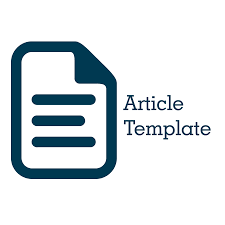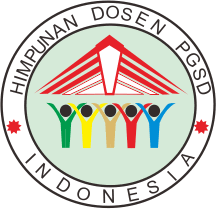Literasi digital guru SD Negeri dan SD Swasta: perceived competency dan implementasi
Abstract
This study explores the difference between public and private school teachers’ self-perceived digital literacy and its implementation in classroom practice. This study only discuss four areas of digital literacy, which consist of devices and software operations, information and data literacy, communication and collaboration, as well as digital content creation. This research used self-reported questionnaires, semi-structured interview, and secondary data gathering to examine teacher’s self-perceived digital literacy and its implementation in classroom practice. The result of this study found that even though there’s no significant difference between public and private school’s teacher self–perceived digital literacy, there are some differences between the implementation of digital literacy in classroom practice. The finding also indicates that even though the teachers did integrate digital literacy in their classroom’s practice, only some pay attention to the cognitive and socio-emotional development of their pupil’s digital literacy.
Keywords
Full Text:
PDFReferences
Ardiansyah R, Atmojo IRW, Saputri DY 2019 Peningkatan Kompetensi Profesional Guru dalam Melaksanakan Pembelajaran melalui Workshop Terintegrasi J. Pend. Dasar 8.
Ibda H, Rahmadi E 2018 Penguatan Literasi Baru pada Guru Madrasah Ibtidaiyah dalam Menjawab Tantangan Era Revolusi Industri 4.0 JRTIE J. Res. Thought. Islam Educ. 1 1–21.
Ariani SEM, Sukarno, Chumdari 2020 Implementasi Gerakan Literasi Sekolah ( GLS ) di SD Negeri Bumi 1 Kota Surakarta Didakt Dwija Indria 8.
Irianto PO, Febrianti LY 2017 Pentingnya Penguasaan Literasi bagi Generasi Muda dalam Menghadapi Mea In: The 1st Educ. and Langu. Inter. Conf. Proc. pp. 640–647.
Permatasari A 2015 Membangun Kualitas Bangsa dengan Budaya Literasi In: Pros. Seminar Nasional Bulan Bahasa UNIB 2015 pp. 146–156.
Eshet-Alkalai Y 2004 Digital Literacy : A Conceptual Framework for Survival Skills in the Digital Era. J. Educ Multimed Hypermedia 13 93–106.
Murray MC, Perez J 2014 Unreveling the Digital Literacy Paradox: how Heigher educational Fails At The Fourth Literacy, Issues in Informing Science And Technology J. Techn. 11
Jin K, Reichert F, Cagasan LP, et al 2020 Measuring digital literacy across three age cohorts: Exploring test dimensionality and performance differences. Comput. Educ. 157 103968.
Ihwanah A 2020 Problematika Pembelajaran Daring di Sekolah Dasar pada Era Pandemi Covid-19 JIEES J. Islam Educ. Elem. Sch. 1.
Mahfud H, Adi FP, Atmojo IRW 2019 Peningkatan Kompetensi Evaluasi Pembelajaran Berbasis Teknologi pada Guru SD di Kota Surakarta J. Pend. Dasar 7 146–150.
Jannah M, Prasojo LD, Jerusalem MA 2020 Elementary School Teachers’ Perceptions of Digital Technology Based Learning in the 21st Century: Promoting Digital Technology as the Proponent Learning Tools Al Ibtida J. Pend. Guru MI 7 1–18.
Güneş E, Bahçivan E 2018 A mixed research-based model for pre-service science teachers’ digital literacy: Responses to “which beliefs” and “how and why they interact” questions Comput. Educ. 118 96–106.
Sumardi L 2020 Does the Teaching and Learning Process in Primary Schools Correspond to the Characteristics of the 21st Century Learning ? Int. J. Instr. 13 357–370.
Sadaf A, Gezer T 2020 Exploring factors that influence teachers’ intentions to integrate digital literacy using the decomposed theory of planned behavior. J. Digit. Learn. Teach. Educ. 36.
Abdulteeef A, Khateeb M Al 2017 Measuring Digital Competence and ICT Literacy : An Exploratory Study of In-Service English Language Teachers in the Context of Saudi Arabia Int. Educ. Stud. 10 38–51.
Kharisma HV 2017 Literasi Digital di Kalangan Guru SMA di Kota Surabaya J. Univ. Air. 6.
Irwandi S, Ufatin N, Sultoni 2016 Peran Sekolah Dalam Menumbuhkembangkan Perilaku Hidup Sehat pada Siswa Sekolah Dasar (Studi Multi Situs di SD Negeri 6 Mataram dan SD Negeri 41 Mataram Kota Mataram Nusa Tenggara Barat) J. Pend. 1 492–498.
UNESCO. 2018 A Global Framework of Reference on Digital Literacy 51.
Bluman AG. 2018 Elemetary Statistics A Step By Approach (New York: McGraw-Hill Education)
Zamir S, Arshad M, Nazir N 2017 A comparative study of self efficacy in public and private school teachers at elementary level J. Elem. Educ. 27 23–36.
Ghonsooly B, Khajavy GH, Mahjoobi FM 2014 Self-efficacy and Metacognition as Predictors of Iranian Teacher Trainees’ Academic Performance: A Path Analysis Approach Procedia - Soc. Behav. Sci. 98 590–598.
Urbančíková N, Manakova N, Bielcheva G 2017 Socio-economic and regional factors of digital literacy related to prosperity Qual. Innov. Prosper. 21 124–141.
Eshet-Alkalai Y, Chajut E 2010 You Can Teach Old Dogs New Tricks: The Factors That Affect Changes over Time in Digital Literacy J. Inf. Technol. Educ. Res. 9 173–181.
Sabrina AR 2019 Literasi Digital Sebagai Upaya Preventif Menanggulangi Hoax J. Commun. Stud. 5 31–46.
Mac Callum K, Jeffrey L, NA K 2014 Factors Impacting Teachers’ Adoption of Mobile Learning. J. Inf. Technol. Educ. Res. 13 141–162.
Fahrimal Y 2018 Nettiquette: Etika Jejaring Sosial Generasi Milenial dalam Media Sosial. J Penelit Pers dan Komun Pembang 22 69–78.
Sadaf A, Johnson BL 2017 Teachers’ Beliefs About Integrating Digital Literacy Into Classroom Practice: An Investigation Based on the Theory of Planned Behavior J. Digit. Learn. Teach. Educ. 33 1–9.
Refbacks
- There are currently no refbacks.



